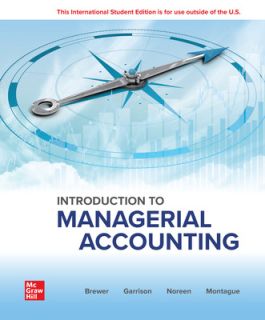Introduction to Managerial Accounting: 2024 Release ISE
1264660898
·
9781264660896
Brewer's Introduction to Managerial Accounting has earned a reputation as the most accessible and readable book on the market. Its manageable chapters and clear presentation point students toward understanding, just as the needle of the compass provi…
Read More
After you purchase your eBook, you will need to download VitalSource Bookshelf, a free app. Then login or create an account and enter the code from your order confirmation email to access your eBook.
- Note: the eBook does not include access to Connect
- Access the eBook anytime, anywhere: online or offline
- Create notes, flashcards and make annotations while you study
- Full searchable content: quickly find the answers you are looking for
1 Managerial Accounting and Cost Concepts
2 Job-Order Costing Calculating Unit Product Costs
3 Job-Order Costing Cost Flows and External Reporting
4 Activity-Based Costing
5 Process Costing
6 Cost-Volume-Profit Relationships
7 Variable Costing and Segment Reporting Tools for Management
8 Master Budgeting
9 Flexible Budgets, Standard Costs, and Variance Analysis
10 Performance Measurement in Decentralized Organizations
11 Differential Analysis The Key to Decision Making
12 Capital Budgeting Decisions
13 Statement of Cash Flows
14 Financial Statement Analysis
2 Job-Order Costing Calculating Unit Product Costs
3 Job-Order Costing Cost Flows and External Reporting
4 Activity-Based Costing
5 Process Costing
6 Cost-Volume-Profit Relationships
7 Variable Costing and Segment Reporting Tools for Management
8 Master Budgeting
9 Flexible Budgets, Standard Costs, and Variance Analysis
10 Performance Measurement in Decentralized Organizations
11 Differential Analysis The Key to Decision Making
12 Capital Budgeting Decisions
13 Statement of Cash Flows
14 Financial Statement Analysis
Brewer's Introduction to Managerial Accounting has earned a reputation as the most accessible and readable book on the market. Its manageable chapters and clear presentation point students toward understanding, just as the needle of the compass provides direction to travelers.
However, the book's authors also understand that everyone's destination may be different. Some students will become accountants, while others are destined for careers in management, marketing, or finance. Not only does the Brewer text teach students managerial accounting concepts concisely, but it also asks students to consider how the concepts they are learning will apply to the real-world situations they will eventually face in their careers. This combination of conceptual understanding and the ability to apply that knowledge directs students toward success, whatever their final destination may be.
However, the book's authors also understand that everyone's destination may be different. Some students will become accountants, while others are destined for careers in management, marketing, or finance. Not only does the Brewer text teach students managerial accounting concepts concisely, but it also asks students to consider how the concepts they are learning will apply to the real-world situations they will eventually face in their careers. This combination of conceptual understanding and the ability to apply that knowledge directs students toward success, whatever their final destination may be.

